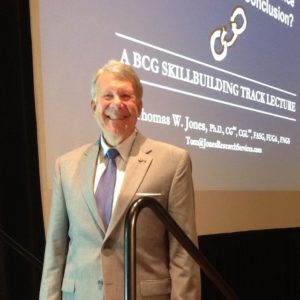SpringBoard, an official blogger for the 2015 NGS Family History Conference, is pleased to offer a review of this skillbuilding lecture, presented Friday, 15 May 2015:
F321: Thomas W. Jones, Ph.D., CG, CGL, FASG, FUGA, FNGS, on “When Does Newfound Evidence Overturn a Proved Conclusion?” reviewed by Sara Anne Scribner, CG
We’ve come to expect adept analysis and a clear presentation from Dr. Thomas W. Jones. This lecture is no exception. It explores a little-seen topic. Focusing on finished genealogical products, Jones details why newfound evidence may appear and how to proceed when it does.

Thomas W. Jones, Ph.D., CG, CGL, FASG, FUGA, FNGS
Jones notes that both expert and less-experienced genealogists may find a previous conclusion affected by new evidence. This may be due to insufficient research, a “reasonably exhaustive research” that missed something, or to newly available evidence, such as a DNA test result. “Meeting the GPS [Genealogical Proof Standard] neither requires nor ensures perfect certainty.”[1] After explaining the GPS, Jones moves onto methods for handling newfound evidence.
New findings often augment or enhance previous work, especially when the original conclusion meets the GPS. Sometimes newfound evidence invalidates earlier work, but Jones notes he has not seen an example of this where the researcher correctly implemented the GPS in the original conclusion.
How one proceeds with newfound evidence depends on who uncovers it. With luck, the original researcher will make the discovery. The lecture provides next steps for the original researcher to authenticate and evaluate the new evidence, essentially by using the GPS to re-evaluate the conclusion in light of the new information. Examples illustrate the use of article updates, useful when a researcher discovers the existence of new evidence either post-publication or just as an article goes to press. Jones also provides tactful and effective strategies to follow when the person with new evidence is someone other than the original researcher.
If you missed this lecture at the 2015 NGS Conference, a recording is available from Jamb Tapes, Inc.
[1] Board for Certification of Genealogists,
Genealogy Standards (Nashville, Tenn.: Ancestry.com, 2014), 3.
CG, Certified Genealogist, CGL, and Certified Genealogical Lecturer are service marks of the Board for Certification of Genealogists, used under license by Board-certified genealogists after periodic competency evaluation, and the board name is registered in the US Patent & Trademark Office.